Top Covid health official calls to scrap Australia's misinformation bill
Dr Nick Coatsworth, who helped lead Australia's Covid response, warns against the 'weaponisation' of misinformation to silence debate
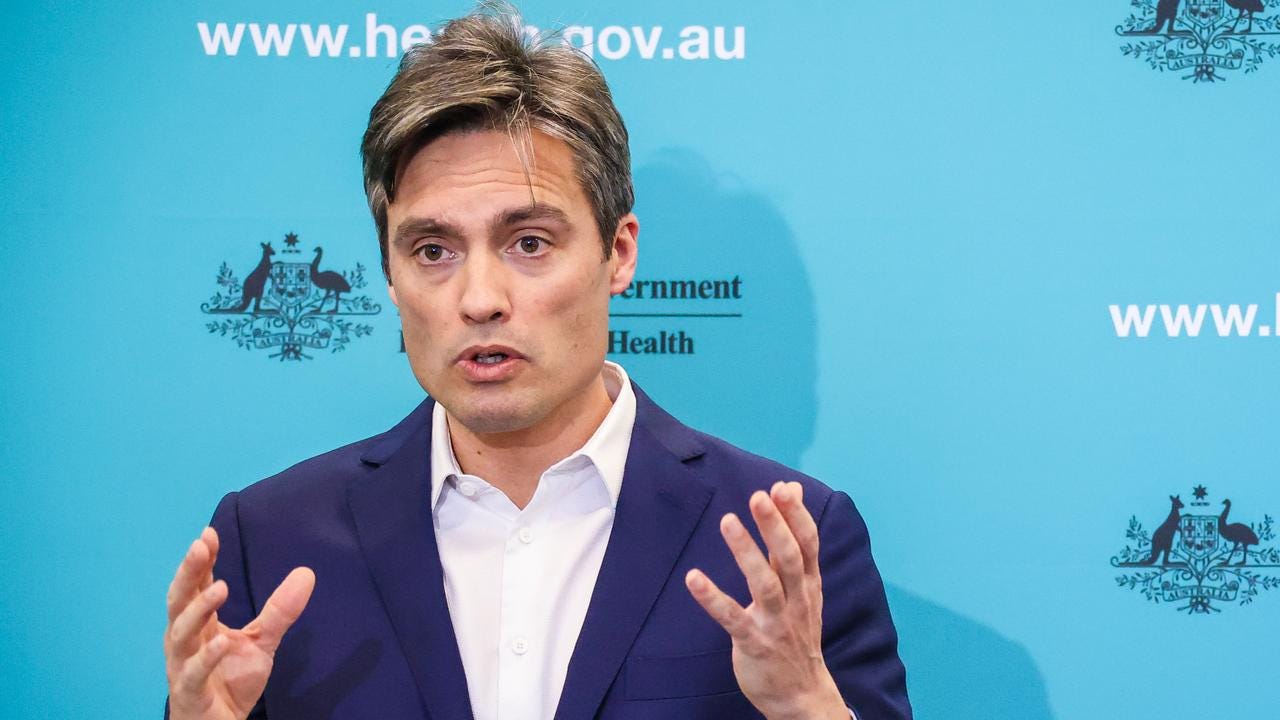
A popular TV doctor and senior health official in Australia’s Covid response has cautioned against the “weaponisation” of misinformation, calling for the Australian Government’s revamped misinformation bill to be “rejected in its entirety.”
Dr Nick Coatsworth, who served as deputy Chief Medical Officer and Senior Medical Advisor on Covid during 2020 and 2021, warns that the centre-left Australian Government’s bill to mitigate harms arising from misinformation and disinformation will lead to the suppression of legitimate debate, causing even greater harms.
Under the proposed laws, digital platforms will be required to demonstrate that they are identifying and preventing the spread of misinformation and disinformation to satisfaction of the Australian Communications and Media Authority (ACMA), or else risk fines of up to 5% of global revenue.
In a statement on X, Dr Coatsworth said that “the branding of legitimate debate on COVID as misinformation both during the pandemic and ongoing” had spurred him to voice his concerns about the bill, which the government hopes to pass into legislation by the end of the year.
As the face of Australia’s Covid advertising campaign during the early stages of the pandemic, Dr Coatsworth pushed the vaccines and mandates on television. The infectious diseases and respiratory medicine specialist later had a change of heart, admitting that “we did get [the mandates] wrong” and admitting that he hadn’t personally had more than three shots because the science didn’t support it.
Dr Coatsworth’s full statement, posted to X yesterday:
“The branding of legitimate debate on COVID as misinformation both during the pandemic and ongoing has provoked me to write a submission to the Senate Committee overseeing the Combatting Misinformation and Disinformation Bill. This bill should be rejected in its entirety[.]
“In the Combatting Misinformation and Disinformation Bill's definition of ‘serious harm,’ the following phrase is used: ‘harm to public health in Australia, including to the efficacy of preventative health measures in Australia.’
“It's quite astonishing to me that after the pandemic, when we are all becoming acutely aware of 'facts' that changed over the course of the pandemic (yes, including the nature of airborne spread, amongst many others), that we would find our parliament debating a Bill where any number of legitimate concerns about public health policy could be branded misinformation by the government or the scientific orthodoxy of the moment.
“Misinformation causes harm. The weaponisation of misinformation as a term to shut down debate causes even greater harm. This bill does the latter.
“Let's teach our kids critical thought and how to question and debate, not how to dismiss or reject other's opinions or ideas with random accusations of misinformation. I'd strongly encourage Australians to do something they may never have done before and submit to the Senate Inquiry. Even if it's a short paragraph expressing deep concern about what this Bill represents.”
At the end, Dr Coatsworth added a link to the Senate Inquiry page for people to make their own submissions.
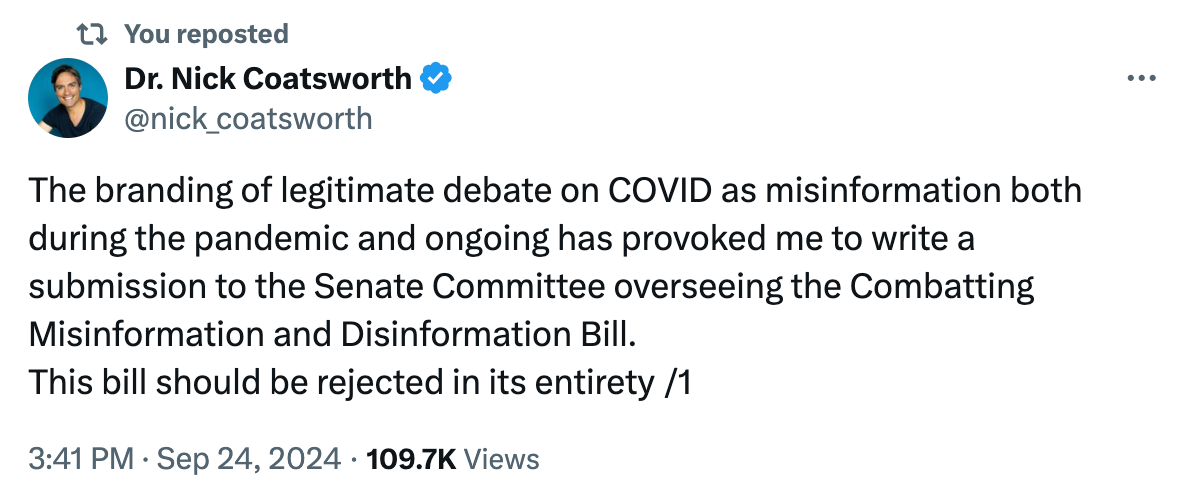
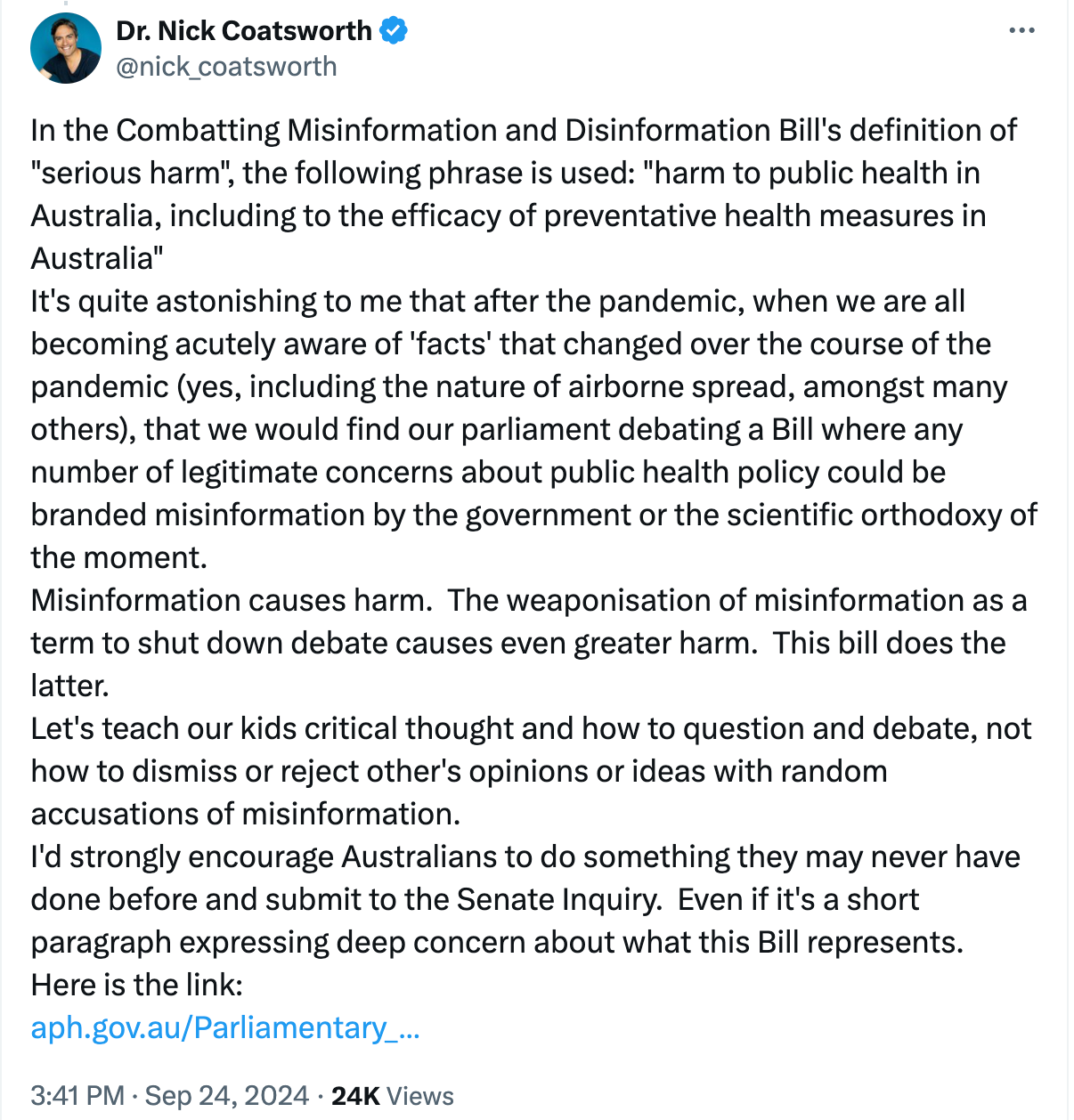
Dr Coatsworth raises two important points not addressed anywhere in the government’s misinformation bill or supporting documentation.
First, those in charge of adjudicating what is and is not misinformation are sometimes wrong, resulting in the censorship of true information. Second, there are harms associated with the suppression of true information.
Though the bill itself is hazy on exactly how misinformation and disinformation will be identified, accompanying documents indicate that information will be sorted according to three criteria:
Prioritising ‘credible and trusted news sources’
Partnering with ‘fact-checkers’
Deferring to advice from official authorities as a proxy for ‘truth’
I pointed out the obvious problems with this information verification system in my article on the resurrected misinformation bill earlier this month:
These are obviously flawed methods for sorting true from false information. “Credible and trusted news sources” routinely publish falsehoods without making follow-up corrections, and fact-checkers frequently make false and biased claims which amount to no more than opinions in a court of law. Platforms using official policy positions as a proxy for ‘truth’ ensure strict adherence to political policies but automatically filter out emerging science and thought.
To take Dr Coatswoth’s example, the World Health Organisation (WHO) incorrectly tweeted in March 2020, “FACT: #COVID19 is NOT airborne,” and continued to downplay the role of airborne transmission throughout the first year of the pandemic, long after the evidence showed that the virus is indeed airborne.
Dr Coatsworth himself participated in spreading this false information, telling media in July 2020 that despite emerging evidence of Covid’s airborne spread, the “overwhelming weight of evidence” still pointed to contact and droplets being the main ways the virus spread.
This was backed up by fact-checkers, who ‘debunked’ social media posts claiming that Covid was airborne largely on the basis that authorities, including the WHO and the Centers for Disease Control (CDC) advised that Covid was primarily spread by droplets.

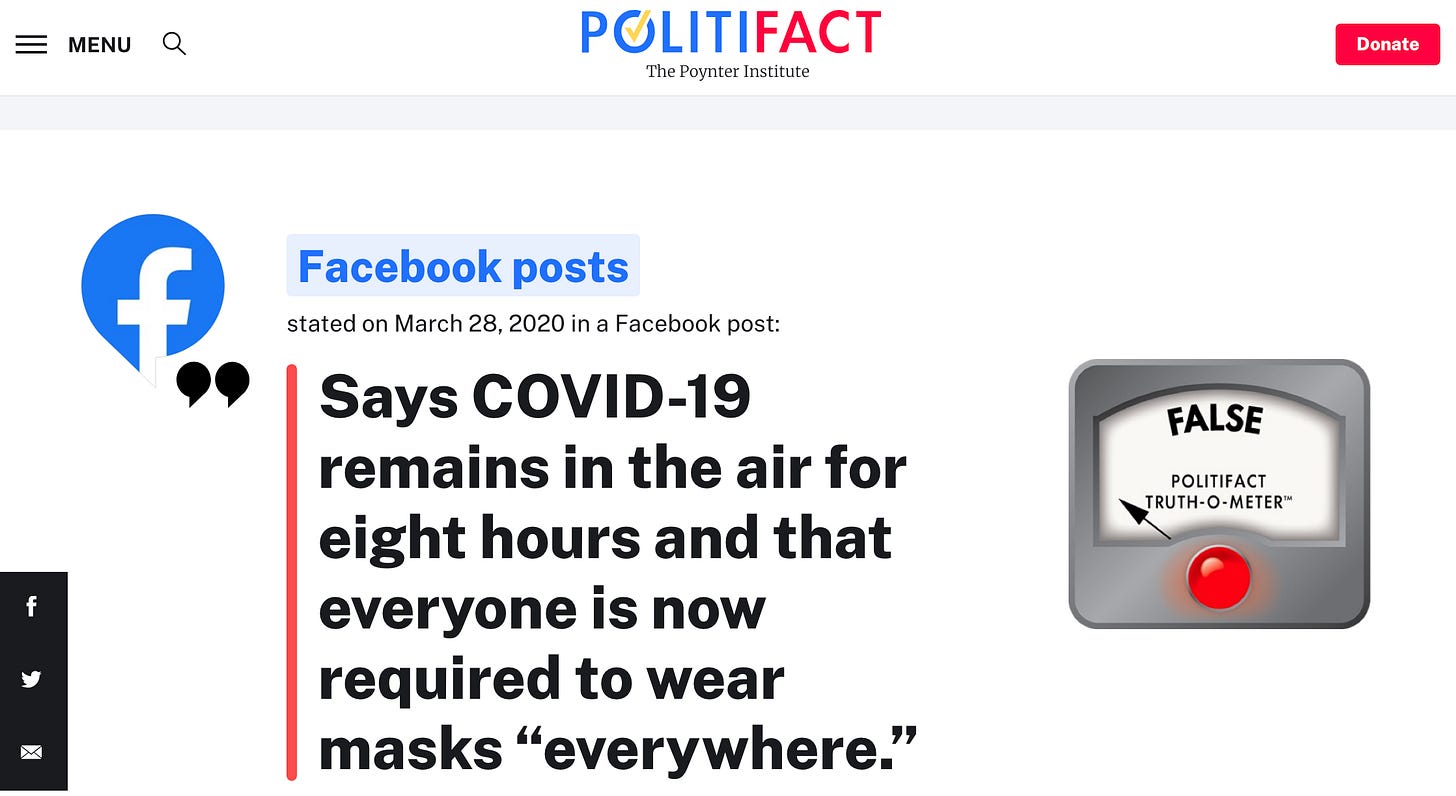

Other falsehoods promulgated by health authorities, experts and fact-checkers include (but are not limited to): flip-flopping on masking efficacy; promising that the vaccines would meaningfully control the spread of the virus; exaggerating the risks of Covid; branding the likely lab origin of the virus as a ‘conspiracy theory’; and denial of now scientifically proven vaccine side effects, such as menstrual irregularities.
Given that authorities, experts and fact-checkers are fallible, it is guaranteed that true information will be suppressed under the proposed laws.
What is the cost of suppressing true information?
In the case of the above-mentioned falsehoods, potentially millions of lives and billions of dollars.
Consider:
How many vulnerable people contracted Covid in the first year of the pandemic because true information about how the virus transmits was censored?
How many vaccinated immunocompromised individuals mingled with vaccinated friends and family believing they were immune to the virus, only to contract it because their ‘protection’ didn’t work as advertised?
How many billions of dollars and well-being years (WELLBYs) were lost as a direct result of unnecessarily aggressive and prolonged lockdowns, while information exposing the authorities’ systematic exaggeration of Covid risks (and overreaction to it) was suppressed?
How many millions of people will die in future lab-derived pandemics because of the failure to admit and address the almost certain lab-origin of this pandemic?
How many people with easily identifiable health risks could have been saved from injury or death if information on vaccine side effects had not been censored?
There are less costly ways of dealing with misinformation.
Dr Coatsworth suggests we “teach our kids critical thought and how to question and debate, not how to dismiss or reject other's opinions or ideas with random accusations of misinformation.”
I would add that teaching media literacy can help people to discern the trustworthiness of online content and media news. But, I mean media literacy based on an understanding of how the media environment and tech works, combined with critical thinking skills, as opposed to dumbed-down exercises teaching people to click through to official websites for their single source of truth.
There is considerable public appetite for media literacy education, by the way.
Communications Minister Michelle Rowland has recently quoted the Adult Media Literacy report (2024) finding that 80% of Australians want authorities to take action on misinformation in support of her Department’s bill.
However, the report, by the Australian Media Literacy Alliance, also found that an even higher proportion of Australians want media literacy education in schools (84%), and for adults (82%). Of those who said they wanted action on misinformation, almost all (94%) said they wanted people to be taught how to identify misinformation.
A final point I would add is that social media features that facilitate constructive conversation can advance the truth-seeking function of public discourse.
Two tools on X are noteworthy in this regard. One is Community Notes, a crowd-sourced feature allowing users to add ‘notes’ to posts that offer clarification, context or refutation. It’s open to being gamed, but in my experience, it is much more effective in assisting users to assess posted content than top-down ‘fact-checker’ labels or censorship.
The second is a pop-up asking the user if they would like to read an article in full before re-sharing it. This puts in a ‘pause,’ encouraging the user to fully engage with the content before further disseminating it.
The Australian Government’s misinformation bill does include provisions for digital platforms to provide media literacy resources to their users, but it does not consider or recommend that digital platforms can address misinformation by refining functions that improve the discursive process.
The misinformation bill supposes that: a select group of appointed experts can reliably detect misinformation and disinformation; that this will prevent harms; and that this will provide net benefit to the Australian people.
These premises are hopelessly misguided, and for this reason I will be joining Dr Coatsworth in submitting my recommendation that the Combatting Misinformation and Disinformation Bill 2024 be rejected in its entirety.
Submissions to the Senate Inquiry into the bill are open until 30 September 2024.
Backgrounder on the misinformation bill here:
Strengthened protections for free speech in Australian Government's revised misinformation bill, but fundamental flaws remain
Last year, the Australian Government’s proposed legislation to combat misinformation and disinformation was shot down in flames after strong backlash over the threat to free expression, and the unfairness of special exemptions for government and media.
To support my work, share, subscribe, and/or make a one-off contribution to DDU via my Kofi account. Thanks!


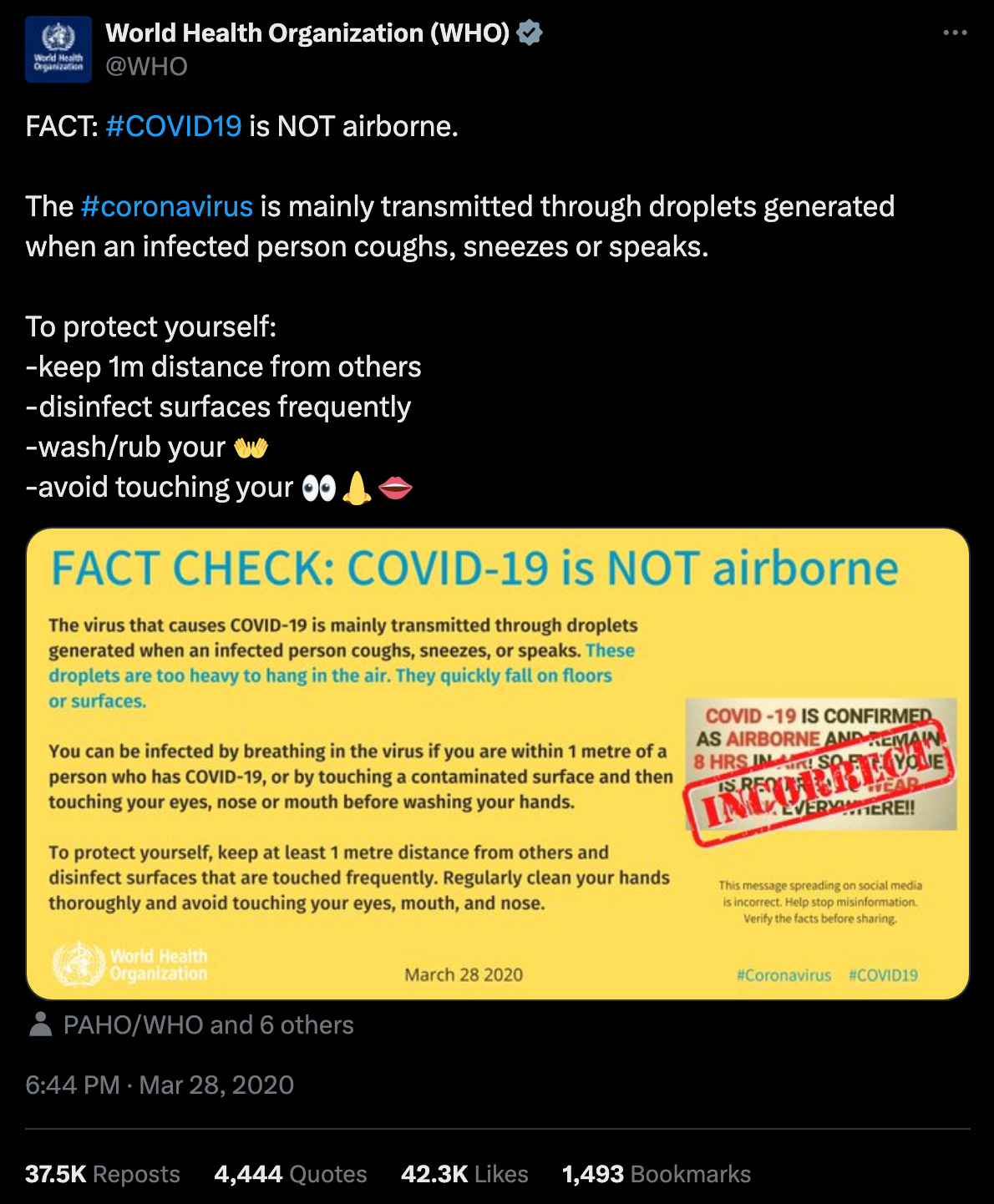

Thank you Rebekah, you are on the ball again. I am sending in a submission before 30th Sept too. On Thursday night 26th September the australiandemocracy.org.au are hosting a zoom about the disinfo bill with a senior lawyer at Human Rights Law Centre speaking. His name is David Mejia-Canales. Just in case any of your readers are interested. I hope it will inform my submission.
I'm finding the relentless push for greater censorship by our authoritarian and deneraly low IQ leaders quite depressing.
As with "The Voice", they refuse to accept any rejection of their plans total control, and plough on regardless.
I really do fear for the future of humanity.